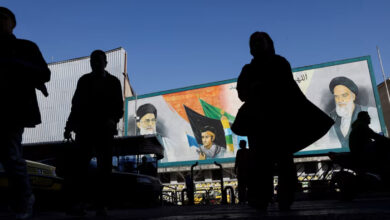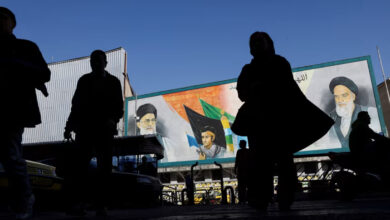The terrorist attacks of 11 September 2001 have reshaped the world, not in terms of geography, but rather in terms of what people around the world find interesting. One feature of this change is that the West seems to be on a quest for a genuine, fact-based understanding of the Middle East. The past years have seen several thousand books and studies published in the West tackling religion, politics, traditions, history, inter-faith relations, and even the content of mass media. Indeed, the number of books addressing issues in the Middle East since the events of 9/11 outnumbers the total volume of publication over the 100 years preceding the 9/11 attacks.
Below I will attempt to shed light on some such publications that have been produced this year in either Europe or the United States.
Iran and the International System
This book is co-authored by Reza Molavi, executive director of the Center for Iranian Studies at Durham University, and Anoush Ehteshami, a professor at the same university. The book is published by Tyler and Franchise and is 200 pages long. Much attention in the West has focused on Iran as a problem and potential nuclear threat, leading to George W. Bush labeling Iran as part of the "axis of evil," and Barack Obama to consider the state a top priority for diplomatic engagement.
This book discusses the factors determining Iran’s international relations, examining the motives of its leaders, the rules laid out by its Islamic constitution, and the Iranian electoral system. The book includes contributions from policy makers inside and outside of Iran, who share their views on diffusing tensions in the Middle East, and the role that Iran could play.
Beware of Small States: Lebanon, Battleground of the Middle East
This book is by David Hirst, a former Middle East correspondent for the British newspaper the Guardian. The publisher is Nation York and its length is 496 pages.
The book discusses Lebanon, that small country where contradictions, political and ideological struggles are prevalent, often degenerating into civil war.
The writer takes us back to the period when Lebanon was part of the Ottoman Empire. He recounts the country’s history of struggle, the loss of Palestine, and the non-stop wars between Arabs and Israel.
Lebanon provides an example of the Arab struggle for independence and the failure of Arab nationalism in favor of fundamentalist Islam, represented in Hezbollah and Hamas. Lebanon, with its numerous internal conflicts, reflects the issues of the whole Middle East.
Democracy, Reform and Authoritarianism in the Arab World
This book, published by Routledge and 1800 pages long, is written by Gerd Nonneman, professor of Middle East Studies at Manchester University and former president of the British Association for Middle East Studies.
Following the 9/11 attacks there has been increased interest in reforming authoritarian rule in the Arab world. Such interest has not been limited to politicians and thinkers but is also shared by ordinary citizen.
In an attempt to examine the possibility of a genuine democracy in the Arab world, Nonneman examines many issues such as the relationship between Islam and politics, the nature of Arab civil society, and the role of the middle class in pushing for political freedom and democracy. Significantly, Nonneman doesn’t neglect the flip side of his hypothesis, with authoritarian regimes losing power and the consequences this scenario would have on both Arab people and on foreign powers with interest in the region.
The Strong Horse: Power, Politics and the Clash of Arab Civilizations
This 256-page-long book by Lee Smith, a Middle East correspondent for a number of magazines such as the New York Times and Boston Globe, and an expert in Arab-American affairs, provides a new perspective on the nature of Arab-American relations following the events of 9/11.
According to Smith, the clash between the East and the West and the growing hostility toward the US is not triggered by US or even Israeli policies. The fundamental reason behind such feelings of animosity, according to the writer, is the conflicts inside the countries of the Arab world themselves.
The US and Israel, Smith claims, aren’t related to the conflicts between Shia and Sunnis, sectarian wars inside Lebanon or even the war between Iraq and Kuwait. Smith believes that Arabs would like to join the super powers in the world and is of the opinion that violence could direct the attention of the US to the region, prompting it to intervene to put an end to authoritarianism and provide the technology and democracy Arabs dream of.
The title comes from a quote by Osama bin Laden in which he said that when faced with strong horse and a weaker one, people naturally love the stronger horse.
Cultural Cleansing in Iraq: Why Museums Were Looted, Libraries Burned and Academics Murdered
This book by Raymond W. Baker, published by Pluto Press and 272 pages long, posits that the US invasion of Iraq led to the collapse of one of the oldest civilizations in the world. Baker claims that the invasion of Iraq sought to drag Iraq into its current state of affairs, one in which the regime would be an agent and follower of the US.
Worse still, according to Baker, the US invasion destroyed Iraqi cultural establishments, left more than 400 scientists dead, and led to the abduction of dozens of researchers, prompting several thousands more physicians, lawyers and intellectuals to flee the country in what bore the appearance of cultural cleansing. Baker argues that the disintegration of Iraq was the reason people there turned towards sectarianism.
Baker, a professor of international politics at Trinity University, believes that the independence and courage of Saddam Hussein’s regime threatened American influence in the Middle East, which is why the US invaded.
Translated from the Arabic Edition.




